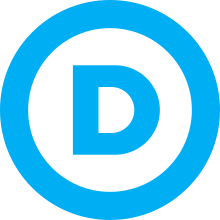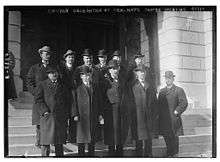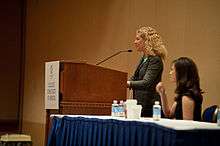Democratic National Committee
The Democratic National Committee (DNC) is the governing body of the United States Democratic Party. It organizes the Democratic National Convention held every four years to nominate a candidate for President of the United States and to formulate the party platform. While it provides support for party candidates, it does not have direct authority over elected officials.[3]
 | |
| Founded | 1848[1][2] |
|---|---|
| Location |
|
Key people |
|
| Website | democrats |
Its chair is elected by the committee. It conducts fundraising to support its activities.[3]
The DNC was established at the 1848 Democratic National Convention.[1] The DNC's main counterpart is the Republican National Committee.
Role and organization
The DNC is responsible for articulating and promoting the Democratic platform and coordinating party organizational activity. When the president is a Democrat, the party generally works closely with the president. In presidential elections, it supervises the national convention and, both independently and in coordination with the presidential candidate, raises funds, commissions polls, and coordinates campaign strategy. Following the selection of a party nominee, the public funding laws permit the national party to coordinate certain expenditures with the nominee, but additional funds are spent on general, party-building activities.[4] There are state committees in every state, as well as local committees in most cities, wards, and towns (and, in most states, counties).
The chairperson of the DNC is elected by vote of members of the Democratic National Committee.[5]:5 The DNC is composed of the chairs and vice-chairs of each state Democratic Party's central committee, two hundred members apportioned among the states based on population and generally elected either on the ballot by primary voters or by the state Democratic Party committee, a number of elected officials serving in an ex officio capacity, and a variety of representatives of major Democratic Party constituencies.

The DNC establishes rules for the caucuses and primaries which choose delegates to the Democratic National Convention, but the caucuses and primaries themselves are most often run not by the DNC but instead by each individual state. Primary elections, in particular, are invariably conducted by state governments according to their own laws. Political parties may choose to participate or not participate in a state's primary election, but no political party executives have any jurisdiction over the dates of primary elections, or how they are conducted.
Outside of the process of nominating a presidential candidate, the DNC's role in actually selecting candidates to run on the party ticket is minimal.
All DNC members are superdelegates to the Democratic National Convention, and their role can affect the outcome over a close primary race. These delegates, officially described as "unpledged party leader and elected official delegates," fall into three categories based on other positions they hold:[6]
- elected members of the Democratic National Committee,
- sitting Democratic governors and members of Congress, and
- distinguished party leaders, consisting of current and former presidents, vice presidents, congressional leaders, and DNC chairs, are all superdelegates for life.
Fundraising
In 2005, the DNC led by Howard Dean introduced the Democracy Bonds program to promote small-donor fundraising.[7]
In the 2016 election cycle, the DNC raised a total of US$75,945,536 as of July 21, 2016. The three largest contributors were Renaissance Technologies (US$677,850), Newsweb Corporation (US$334,000), and Total Wine (US$298,100).[8]
In the 2020 election cycle, the DNC raised a total of US$107,030,025 as of June 23, 2020. The three largest contributors were Renaissance Technologies (US$910,000), Microsoft (US$897,423), and Art Advisors LLC (US$710,000).[9]
In June 2008, after Senator Barack Obama became the presumptive Democratic presidential nominee, Dean announced that the DNC, emulating the Obama campaign, would no longer accept donations from federal lobbyists.[10] In July 2015, during the 2016 election cycle, the DNC, led by Debbie Wasserman Schultz, reversed this policy.[11]
Leadership
- Chair: Tom Perez, former U.S. Secretary of Labor under Barack Obama[12]
- Vice Chair of Civic Engagement and Voter Participation: Karen Carter Peterson[13]
- Vice Chairs:
- Michael Blake, New York Assemblyman[13]
- Jaime Harrison, Associate Chair and former South Carolina Democratic Party Chairman[13]
- Maria Elena Durazo, Executive Secretary–Treasurer of the AFL-CIO[14]
- Ken Martin, Chair of the Minnesota Democratic-Farmer-Labor Party[15]
- Grace Meng, U.S. Representative from New York's 6th congressional district[16]
- Treasurer: William "Bill" Derrough[17]
- Secretary: Jason Rae[18]
- Finance Chair: Chris Korge II[14]
In addition, a National Advisory Board exists for purposes of fundraising and advising the executive. The present chair is Elizabeth Frawley Bagley, former U.S. Ambassador to Portugal.
Chairs
Deputy Chairs
The Deputy Chair of the Democratic National Committee was re-established by Tom Perez in February 2017 after his win in the 2017 DNC Chair race.
After a close victory over Minnesota Congressman Keith Ellison, Perez appointed Ellison as Deputy Chair in an attempt to lessen the divide in the Democratic Party after the contentious 2016 Democratic presidential primaries, which saw conflicts between supporters of Hillary Clinton and Bernie Sanders.[20] Perez was seen as being more in line with the Clinton wing, while Ellison was more in line with the Sanders wing.[21] The role's revival in 2017 has been described by critics as largely titular and ceremonial.[22]
On November 8, 2018, Ellison resigned from the position due to his win in the Minnesota Attorney General election.[23] The position remains unoccupied.
| Officeholder | Term | State |
|---|---|---|
| Ben Johnson[24] | 2003–2005 | Maryland |
| Mike Honda | 2003–2005 | California |
| Susan Turnbull | 2003–2005 | Maryland |
| Keith Ellison | 2017–2018[25] | Minnesota |
Controversies
Watergate
In the 1970s, the DNC had its head office in the Watergate complex, which was burglarized by entities working for Richard Nixon's administration during the Watergate scandal.
Chinagate
Chinagate was an alleged effort by the People's Republic of China to influence domestic American politics prior to and during the Clinton administration.[26] In 2002, the Federal Election Commission fined the Democratic National Committee $115,000 for its part in fundraising violations in 1996.[27]
Cyber attacks

Cyber attacks and hacks were claimed by or attributed to various individual and groups such as:
- According to committee officials and security experts, two competing Russian intelligence services were discovered on DNC computer networks. One intelligence service achieved infiltration beginning in the summer of 2015 and the other service breached and roamed the network beginning in April 2016. The two groups accessed emails, chats, and research on an opposing presidential candidate. They were expelled from the DNC system in June 2016.[28][29][30]
- The hacker Guccifer 2.0 claimed that he hacked into the Democratic National Committee computer network and then leaked its emails to the newspaper The Hill.[31][32] During a CNN interview with Jake Tapper, Hillary Clinton's campaign manager, Robby Mook, cited experts saying that the DNC emails were leaked by the Russians but did not name the experts.[33][34] The press and cybersecurity firms discredited the Guccifer 2.0 claim, as investigators now believe Guccifer 2.0 was an agent of the G.R.U., Russia's military intelligence service.[28][30][35][36]
2016 email leak
On July 22, 2016, WikiLeaks released approximately 20,000 DNC emails.[37] Critics claimed that the Committee unequally favored Hillary Clinton and acted in support of her nomination while opposing the candidacy of her primary challenger Bernie Sanders. Donna Brazile corroborated these allegations in an excerpt of her book published by Politico in November 2017.[38] The leaked emails spanned sixteen months, terminating in May 2016.[39]
The WikiLeaks releases led to the resignations of Chairperson Debbie Wasserman Schultz, Communications Director Luis Miranda, Chief Financial Officer Brad Marshall and Chief Executive Amy Dacey.[40] After she resigned, Wasserman Schultz put out a statement about possible FBI assistance in investigating the hacking and leaks, saying that "the DNC was never contacted by the FBI or any other agency concerned about these intrusions."[41] During a Senate hearing in January 2017, James Comey testified that the FBI requested access to the DNC's servers, but its request was denied. He also testified that old versions of the Republican National Committee's servers were breached, but then-current databases were unaffected.[42]
The DNC subsequently filed a lawsuit in federal court against WikiLeaks and others alleging a conspiracy to influence the election.[43]
History
The DNC has existed since 1848.[44] During the 1848 Democratic National Convention, a resolution was passed creating the Democratic National Committee, composed of thirty members, one person per state, chosen by the states' delegations, and chaired by Benjamin F. Hallett.[45]
See also
References
- Party History. Retrieved February 17, 2007. Archived November 4, 2006, at the Wayback Machine
- Smith, Melissa M.; Williams, Glenda C.; Powell, Larry; Copeland, Gary A. (2010). Campaign Finance Reform: The Political Shell Game. Lexington Books. p. 14. ISBN 9780739145678. Retrieved October 26, 2017.
- "Democrats.org". DNC. Archived from the original on June 17, 2017. Retrieved January 29, 2017.
- "Public Funding of Presidential Elections". Federal Election Commission. February 2005. Retrieved October 29, 2006.
- DNC 2018 Charter
- "Delegate Selection Materials For the 2016 Democratic National Convention" (PDF). December 15, 2014. Retrieved May 19, 2016.
- 2006 Democracy Bonds. Retrieved on August 2, 2007. Archived August 13, 2007, at the Wayback Machine
- "Top Contributors DNC 2016 Election". OpenSecrets.org. Center for Responsive Politics. July 21, 2016. Retrieved August 3, 2016.
- "Democratic National Cmte". OpenSecrets.org. Center for Responsive Politics. Retrieved June 23, 2020.
- Rhee, Foon (June 5, 2008). "DNC bars Washington lobbyist money". The Boston Globe. Archived from the original on July 15, 2008.
- Smilowitz, Elliot (July 24, 2015). "DNC to allow lobbyist money to fund conventions". The Hill. Retrieved August 2, 2016.
- David Weigel (February 25, 2017). "Thomas Perez elected the first Latino leader of Democratic Party". The Washington Post. Retrieved February 25, 2017.
- Tani, Maxwell (April 19, 2017). "DNC rolls out new jobs for top brass, including Keith Ellison's newly created position". Business Insider. Retrieved March 27, 2019.
- Democratic National Committee (January 22, 2013). "Democratic National Committee Elects New Officers at Meeting in Washington Today". Democrats.org. Archived from the original on February 2, 2013. Retrieved January 25, 2013.
- "Democratic Party on Twitter". Twitter. Retrieved February 27, 2017.
- "Rep. Grace Meng Elected DNC Vice Chairwoman". Roll Call. July 29, 2016. Retrieved July 29, 2016.
- "Democratic Party on Twitter". Twitter. Retrieved February 26, 2017.
- "Democratic Party on Twitter". Twitter. Retrieved February 26, 2017.
- Lawrence Kestenbaum. "A Database of Historic Cemeteries". The Political Graveyard web site. Retrieved December 29, 2010.
- Bradner, Eric (February 26, 2017). "Perez wins DNC chairmanship". CNN. Retrieved August 24, 2019.
- Chang, Clio (February 23, 2017). "The Case for Tom Perez Makes No Sense". The New Republic. Retrieved March 12, 2017.
- Evans, Lauren (February 25, 2017). "Tom Perez Elected to Head DNC, Edging Out Keith Ellison". Jezebel. Retrieved March 12, 2017.
- Lim, Naomi (November 9, 2018). "Keith Ellison resigns from DNC post". Washington Examiner. Retrieved August 24, 2019.
- "Ben Johnson | The HistoryMakers". The History Makers. Retrieved March 20, 2017.
- "DNC's second in command steps down after winning attorney general race in Minnesota". USA Today. Retrieved December 14, 2018.
- "Fund-raiser Charlie Trie pleads guilty under plea agreement". CNN. May 21, 1999. Archived from the original on August 5, 2006.
- "DNC fined for illegal 1996 fund raising". CNN. September 23, 2002. Archived from the original on May 14, 2008.
- Nakashima, Ellem (June 14, 2016). "Russian government hackers penetrated DNC, stole opposition research on Trump". The Washington Post. Washington, D.C. Retrieved July 22, 2016.
- "'Lone Hacker' Claims Responsibility for Cyber Attack on Democrats". NBC News. June 16, 2016. Retrieved July 27, 2016.
- Sanger, David E.; Corasaniti, Rick (June 14, 2016). "D.N.C. Says Russian Hackers Penetrated Its Files, Including Dossier on Donald Trump". The New York Times. New York City. Retrieved July 24, 2016.
- Uchill, Joe (July 13, 2016). "Guccifer 2.0 releases new DNC docs". The Hill. Retrieved July 27, 2016.
- Joe, Uchill (July 18, 2016). "New Guccifer 2.0 dump highlights 'wobbly Dems' on Iran deal". The Hill. Retrieved July 27, 2016.
- Bump, Philip (March 5, 2018). "The Russian interference fight was encapsulated in one CNN show in July 2016". Washington Post. Retrieved July 27, 2016.
- "EXCLUSIVE: WikiLeaks' Julian Assange on Releasing DNC Emails That Ousted Debbie Wasserman Schultz". Democracy Now!. July 25, 2016. Retrieved July 27, 2016.
- Alperovitch, Dmitri (June 15, 2016). "Bears in the Midst: Intrusion into the Democratic National Committee". From The Front Lines. CrowdStrike, Inc. Retrieved July 22, 2016.
- Sanger, David E.; Schmitt, Eric (July 26, 2016). "Spy Agency Consensus Grows That Russia Hacked D.N.C." The New York Times. Retrieved July 27, 2016.
- "WikiLeaks - Search the DNC email database". WikiLeaks. July 22, 2016. Retrieved August 3, 2016.
- Brazile, Donna (November 2, 2017). "Inside Hillary Clinton's Secret Takeover of the DNC". Politico. Retrieved November 4, 2017.
- Uchill, Joe (July 22, 2016). "WikiLeaks posts 20,000 DNC emails". The Hill. Retrieved July 23, 2016.
- Phillip, Abby; Zezima, Katie (August 2, 2016). "Top Democratic National Committee officials resign in wake of email breach". The Washington Post. Retrieved August 4, 2016.
- Wright, Austin (June 21, 2017). "Jeh Johnson: DNC did not want DHS help following election hack". Politico.
- Schultheis, Emily (January 10, 2017). "FBI Director Comey: Agency requested access to DNC servers". CBS News.
- Hamburger, Tom; Helderman, Rosalind S.; Nakashima, Ellen (April 20, 2017). "Democratic Party sues Russia, Trump campaign and WikiLeaks alleging 2016 campaign conspiracy". The Washington Post.
- Macy, Jesse (1914). "Committees, Party". In McLaughlin, Andrew Cunningham; Bushnell Hart, Albert (eds.). Cyclopedia of American Government. 1. pp. 361–363.CS1 maint: ref=harv (link)
- Edwin Howe, Joseph (1919). The Democratic National Committee, 1830–1876 (Master's thesis). University of Wisconsin–Madison – via Google Books.
External links
| Wikimedia Commons has media related to Democratic National Committee. |
- Official website
- The Charter & The Bylaws of the Democratic Party of the United States (PDF) as amended by the DNC; August 25, 2018
- Democratic National Committee – 2016 (members)